- Home
- Samuel Beckett
Mercier and Camier
Mercier and Camier Read online
Mercier and Camier
WORKS BY SAMUEL BECKETT PUBLISHED BY GROVE PRESS
Collected Poems in English and French
The Collected Shorter Plays
(All That Fall, Act Without Words I, Act Without Words II, Krapp’s Last Tape, Rough for Theatre I, Rough for Theatre II, Embers, Rough for Radio I, Rough for Radio II, Words and Music, Cascando, Play, Film, The Old Tune, Come and Go, Eh Joe, Breath, Not I, That Time, Footfalls, Ghost Trio, … but the clouds …, A Piece of Monologue, Rockaby, Ohio Impromptu, Quad, Catastrophe, Nacht and Träume, What Where)
The Complete Short Prose: 1929–1989
(Assumption, Sedendo et Quiescendo, Text, A Case in a Thousand, First Love, The Expelled, The Calmative, The End, Texts for Nothing 1–13, From an Abandoned Work, The Image, All Strange Away, Imagination Dead Imagine, Enough, Ping, Lessness, The Lost Ones, Fizzles 1–8, Heard in the Dark 1, Heard in the Dark 2, One Evening, As the story was told, The Cliff, neither, Stirrings Still, Variations on a “Still” Point, Faux Départs, The Capital of the Ruins)
Disjecta: Miscellaneous Writings and a Dramatic Fragment
Endgame and Act Without Words
Ends and Odds
First Love and Other Shorts
Happy Days
How It Is
I Can’t Go On, I’ll Go On:
A Samuel Beckett Reader
Krapp’s Last Tape
(All That Fall, Embers, Act Without Words I, Act Without Words II)
Mercier and Camier
Molloy
More Pricks Than Kicks
(Dante and the Lobster, Fingal, Ding-Dong, A Wet Night, Love and Lethe, Walking Out, What a Misfortune, The Smeraldina’s Billet Doux, Yellow, Draff)
Murphy
Nohow On
(Company, Ill Seen Ill Said, Worstward Ho)
The Poems, Short Fiction, and Criticism of Samuel Beckett
Rockaby and Other Short Plays
(Rockaby, Ohio Impromptu, All Strange Away, and A Piece of Monologue)
The Selected Works of Samuel Beckett (boxed paperback set)
Volume I: Novels
(Murphy, Watt, Mercier and Camier)
Volume II: Novels
(Molloy, Malone Dies, The Unnamable, How It Is)
Volume III: Dramatic Works
Volume IV: Poems, Short Fiction, Criticism
Stories and Texts for Nothing
(The Expelled, The Calmative, The End, Texts for Nothing 1–13)
Three Novels
(Molloy, Malone Dies, The Unnamable)
Waiting for Godot
Waiting for Godot: A Bilingual Edition
Watt
Mercier and Camier
Samuel Beckett
Copyright © 1970 by Les Éditions de Minuit
English translation copyright © 1974 by the Estate of Samuel Beckett
Originally published in French in 1970 by
Les Éditions de Minuit, Paris, under the title Mercier et Camier.
First published in the author’s translation in 1974
in Great Britain by Calder & Boyars Ltd., London.
The first Grove Press edition was published in 1975.
All rights reserved. No part of this book may be reproduced in any form or by any electronic or mechanical means, including information storage and retrieval systems, without permission in writing from the publisher, except by a reviewer, who may quote brief passages in a review. Scanning, uploading, and electronic distribution of this book or the facilitation of such without the permission of the publisher is prohibited. Please purchase only authorized electronic editions, and do not participate in or encourage electronic piracy of copyrighted materials. Your support of the author’s rights is appreciated. Any member of educational institutions wishing to photocopy part or all of the work for classroom use, or anthology, should send inquiries to Grove/Atlantic, Inc., 841 Broadway, New York, NY 10003 or [email protected].
Design, composition, and textual supervision by Laura Lindgren
Printed in the United States of America
Library of Congress Catalog Card Number: 74-21639
eBook ISBN-13: 978-0-8021-9878-5
Grove Press
an imprint of Grove/Atlantic, Inc.
841 Broadway
New York, NY 10003
DISTRIBUTED BY PUBLISHERS GROUP WEST
WWW.GROVEATLANTIC.COM
Mercier and Camier
I
The journey of Mercier and Camier is one I can tell, if I will, for I was with them all the time.
Physically it was fairly easy going, without seas or frontiers to be crossed, through regions untormented on the whole, if desolate in parts. Mercier and Camier did not remove from home, they had that great good fortune. They did not have to face, with greater or less success, outlandish ways, tongues, laws, skies, foods, in surroundings little resembling those to which first childhood, then boyhood, then manhood had inured them. The weather, though often inclement (but they knew no better), never exceeded the limits of the temperate, that is to say of what could still be borne, without danger if not without discomfort, by the average native fittingly clad and shod. With regard to money, if it did not run to first class transport or the palatial hotel, still there was enough to keep them going, to and fro, without recourse to alms. It may be said therefore that in this respect too they were fortunate, up to a point. They had to struggle, but less than many must, less perhaps than most of those who venture forth, driven by a need now clear and now obscure.
They had consulted together at length, before embarking on this journey, weighing with all the calm at their command what benefits they might hope from it, what ills apprehend, maintaining turn about the dark side and the rosy. The only certitude they gained from these debates was that of not lightly launching out, into the unknown.
Camier was first to arrive at the appointed place. That is to say that on his arrival Mercier was not there. In reality Mercier had forestalled him by a good ten minutes. Not Camier then, but Mercier, was first to arrive. He possessed himself in patience for five minutes, with his eye on the various avenues of approach open to his friend, then set out for a saunter destined to last full fifteen minutes. Meantime Camier, five minutes having passed without sight or sign of Mercier, took himself off in his turn for a little stroll. On his return to the place, fifteen minutes later, it was in vain he cast about him, and understandably so. For Mercier, after cooling his heels for a further five minutes, had wandered off again for what he pleased to call a little stretch. Camier hung around for five more minutes, then again departed, saying to himself, Perhaps I’ll run into him in the street. It was at this moment that Mercier, back from his breather, which as chance this time would have it had not exceeded ten minutes, glimpsed receding in the morning mist a shape suggestive of Camier’s and which was indeed none other. Unhappily it vanished as though swallowed up by the cobbles, leaving Mercier to resume his vigil. But on expiry of what is beginning to look like the regulation five minutes he abandoned it again, feeling the need of a little motion. Their joy was thus for an instant unbounded, Mercier’s joy and Camier’s joy, when after five and ten minutes respectively of uneasy prowl, debouching simultaneously on the square, they found themselves face to face for the first time since the evening before. The time was nine fifty in the morning.
In other words:
What stink of artifice.
They were still in each other’s arms when the rain began to fall, with quite oriental abruptness. They made therefore with all speed to the shelter which, in the form of a pagoda, had been erected here as protection from the rain and other inclemencies, in a word from the weather. Shadowy and abounding in nooks and crannies it was a friend to lovers also
and to the aged of either sex. Into this refuge, at the same instant as our heroes, bounded a dog, followed shortly by a second. Mercier and Camier, irresolute, exchanged a look. They had not finished in each other’s arms and yet felt awkward about resuming. The dogs for their part were already copulating, with the utmost naturalness.
The place where they now found themselves, where they had agreed, not without pains, that they should meet, was not properly speaking a square, but rather a small public garden at the heart of a tangle of streets and lanes. It displayed the usual shrubberies, flower-beds, pools, fountains, statues, lawns and benches in strangulating profusion. It had something of the maze, irksome to perambulate, difficult of egress, for one not in its secrets. Entry was of course the simplest thing in the world. In the centre, roughly, towered huge a shining copper beech, planted several centuries earlier, according to the sign rudely nailed to the bole, by a Field Marshal of France peacefully named Saint-Ruth. Hardly had he done so, in the words of the inscription, when he was struck dead by a cannon-ball, faithful to the last to the same hopeless cause, on a battlefield having little in common, from the point of view of landscape, with those on which he had won his spurs, first as brigadier, then as lieutenant, if that is the order in which spurs are won, on the battlefield. It was no doubt to this tree that the garden owed its existence, a consequence which can scarcely have occurred to the Field Marshal as on that distant day, well clear of the quincunxes, before an elegant and replete assistance, he held the frail sapling upright in the hole gorged with evening dew. But to have done with this tree and hear no more about it, from it the garden derived what little charm it still possessed, not to mention of course its name. The stifled giant’s days were numbered, it would not cease henceforward to pine and rot till finally removed, bit by bit. Then for a while, in the garden mysteriously named, people would breathe more freely.
Mercier and Camier did not know the place. Hence no doubt their choice of it for their meeting. Certain things shall never be known for sure.
Through the orange panes the rain to them seemed golden and brought back memories, determined by the hazard of their excursions, to the one of Rome, of Naples to the other, mutually unavowed and with a feeling akin to shame. They should have felt the better for this glow of distant days when they were young, and warm, and loved art, and mocked marriage, and did not know each other, but they felt no whit the better.
Let us go home, said Camier.
Why? said Mercier.
It won’t stop all day, said Camier.
Long or short, tis but a shower, said Mercier.
I can’t stand there doing nothing, said Camier.
Then let us sit, said Mercier.
Worse still, said Camier.
Then let us walk up and down, said Mercier, yes, arm in arm let us pace to and fro. There is not much room, but there might be even less. Lay down our umbrella, there, help me off with our knapsack, so, thanks, and off we go.
Camier submitted.
Every now and then the sky lightened and the rain abated. Then they would halt before the door. This was the signal for the sky to darken again and the rain to redouble in fury.
Don’t look, said Mercier.
The sound is enough, said Camier.
True, said Mercier.
After a moment of silence Mercier said:
The dogs don’t trouble you?
Why does he not withdraw? said Camier.
He cannot, said Mercier.
Why? said Camier.
One of nature’s little gadgets, said Mercier, no doubt to make insemination double sure.
They begin astraddle, said Camier, and finish arsy-versy.
What would you? said Mercier. The ecstasy is past, they yearn to part, to go and piss against a post or eat a morsel of shit, but cannot. So they turn their backs on each other. You’d do as much, if you were they.
Delicacy would restrain me, said Camier.
And what would you do? said Mercier.
Feign regret, said Camier, that I could not renew such pleasure incontinent.
After a moment of silence Camier said:
Let us sit us down, I feel all sucked off.
You mean sit down, said Mercier.
I mean sit us down, said Camier.
Then let us sit us down, said Mercier.
On all hands already the workers were at it again, the air waxed loud with cries of pleasure and pain and with the urbaner notes of those for whom life had exhausted its surprises, as well on the minus side as on the plus. Things too were getting ponderously under way. It was in vain the rain poured down, the whole business was starting again with apparently no less ardour than if the sky had been a cloudless blue.
You kept me waiting, said Mercier.
On the contrary, said Camier.
I arrived at nine five, said Mercier.
And I at nine fifteen, said Camier.
You see, said Mercier.
Waiting, said Camier, and keeping waiting can only be with reference to a pre-arranged terminus.
And for what hour was our appointment, according to you? said Mercier.
Nine fifteen, said Camier.
Then you are grievously mistaken, said Mercier.
Meaning? said Camier.
Will you never have done astounding me? said Mercier.
Explain yourself, said Camier.
I close my eyes and live it over again, said Mercier, your hand in mine, tears rising to my eyes and the sound of my faltering voice, So be it, tomorrow at nine. A drunken woman passed by, singing a ribald song and hitching up her skirts.
She went to your head, said Camier. He took a notebook from his pocket, turned the leaves and read: Monday 15, St. Macanus, 9:15, St. Ruth, collect umbrella at Helen’s.
And what does that prove? said Mercier.
My good faith, said Camier.
True, said Mercier.
We shall never know, said Camier, at what hour we arranged to meet today, so let us drop the subject.
In all this confusion one thing alone is sure, said Mercier, and that is that we met at ten to ten, at the same time as the hands, or rather a moment later.
There is that to be thankful for, said Camier.
The rain had not yet begun, said Mercier.
The morning fervour was intact, said Camier.
Don’t lose our agenda, said Mercier.
At this moment suddenly appeared from nowhere the first of a long line of maleficent beings. His uniform, sickly green in colour, its place of honour rife with heroic emblems and badges, suited him down to the ground. Inspired by the example of the great Sarsfield he had risked his life without success in defence of a territory which in itself must have left him cold and considered as a symbol cannot have greatly heated him either. He carried a stick at once elegant and massive and even leaned on it from time to time. He suffered torment with his hip, the pain shot down his buttock and up his rectum deep into the bowels and even as far north as the pyloric valve, culminating as a matter of course in uretroscrotal spasms with quasi-incessant longing to micturate. Invalided out with a grudging pension, whence the sour looks of nearly all those, male and female, with whom his duties and remnants of bonhomie brought him daily in contact, he sometimes felt it would have been wiser on his part, during the great upheaval, to devote his energies to the domestic skirmish, the Gaelic dialect, the fortification of his faith and the treasures of a folklore beyond compare. The bodily danger would have been less and the benefits more certain. But this thought, when he had relished all its bitterness, he would banish from his mind, as unworthy of it. His moustache, once stiff as the lip it was grown to hide, was no longer so. From time to time, when he remembered, with a blast from below of fetid breath mingled with spittle, he straightened it momentarily. Motionless at the foot of the pagoda steps, his cape agape, streaming with rain, he darted his eyes to and fro, from Mercier and Camier to the dogs, from the dogs to Mercier and Camier.
Who owns that bicycle? he said.<
br />
Mercier and Camier exchanged a look.
We could have done without this, said Camier.
Shift her, said the ranger.
It may prove diverting, said Mercier.
Who owns them dogs? said the ranger.
I don’t see how we can stay, said Camier.
Can it I wonder be the fillip we needed, to get us moving? said Mercier.
The ranger mounted the steps of the shelter and stood stock still in the doorway. The air darkened immediately and turned a deeper yellow.
I think he is about to attack us, said Camier.
I leave the balls to you, as usual, said Mercier.
Dear sergeant, said Camier, what exactly can we do for you?
You see that bicycle? said the ranger.
I see nothing, said Camier. Mercier, do you see a bicycle?
Is she yours? said the ranger.
A thing we do not see, said Camier, for whose existence we have only your word, how are we to tell if it is ours, or another’s?
Why would it be ours? said Mercier. Are these dogs ours? No. We see them today for the first time. And you would have it that the bicycle, assuming it exists, is ours? And yet the dogs are not ours.
Bugger the dogs, said the ranger.
But as if to give himself the lie he fell on them with stick and boot and drove them cursing from the pagoda. Tied together as they still were, by the post-coitus, their retreat was no easy matter. For the efforts they made to escape, acting equally in opposite directions, could not but annul each other. They must have greatly suffered.
He has now buggered the dogs, said Mercier.
He has driven them from the shelter, said Camier, there is no denying that, but by no means from the garden.
The rain will soon wash them loose, said Mercier. Less rut-besotted they would have thought of it themselves.
The fact is he has done them a service, said Camier.
Let us show him a little kindness, said Mercier, he’s a hero of the great war. Here we were, high and dry, masturbating full pelt without fear of interruption, while he was crawling in the Flanders mud, shitting in his puttees.

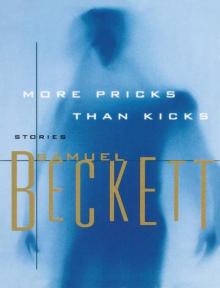 More Pricks Than Kicks
More Pricks Than Kicks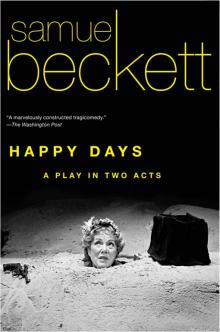 Happy Days
Happy Days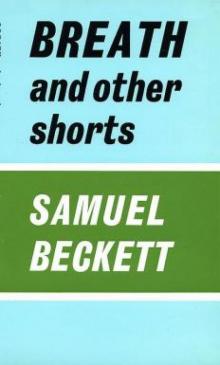 Breath, and Other Shorts
Breath, and Other Shorts Endgame & Act Without Words
Endgame & Act Without Words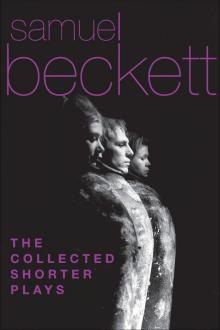 The Collected Shorter Plays of Samuel Beckett
The Collected Shorter Plays of Samuel Beckett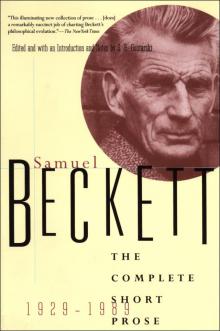 The Complete Short Prose, 1929-1989
The Complete Short Prose, 1929-1989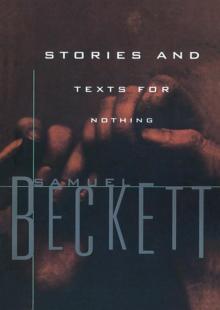 Stories and Texts for Nothing
Stories and Texts for Nothing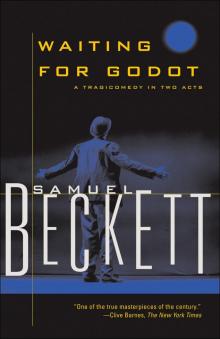 Waiting for Godot
Waiting for Godot Rockaby and Other Short Pieces
Rockaby and Other Short Pieces First Love and Other Shorts
First Love and Other Shorts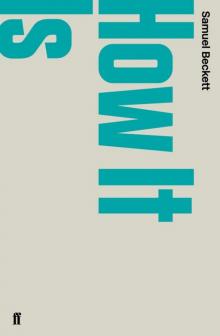 How It Is
How It Is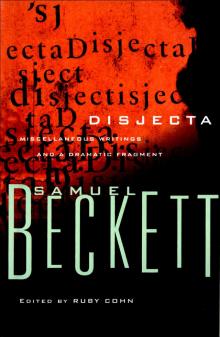 Disjecta: Miscellaneous Writings and a Dramatic Fragment
Disjecta: Miscellaneous Writings and a Dramatic Fragment Echo's Bones
Echo's Bones Texts for Nothing and Other Shorter Prose 1950-1976
Texts for Nothing and Other Shorter Prose 1950-1976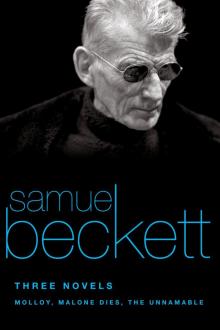 Three Novels
Three Novels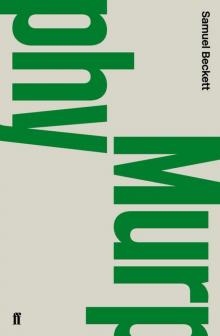 Murphy
Murphy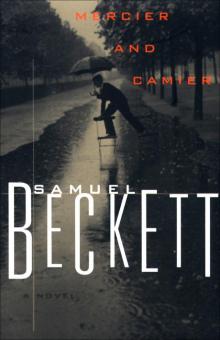 Mercier and Camier
Mercier and Camier Eleuthéria
Eleuthéria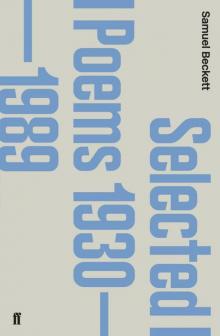 Selected Poems 1930-1988
Selected Poems 1930-1988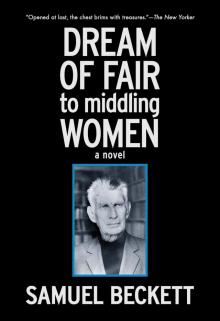 Dream of Fair to Middling Women
Dream of Fair to Middling Women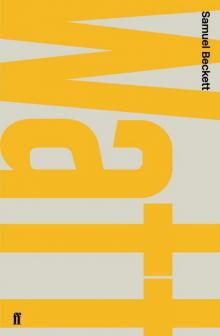 Watt
Watt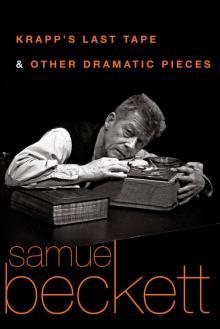 Krapp's Last Tape and Other Dramatic Pieces
Krapp's Last Tape and Other Dramatic Pieces The Complete Dramatic Works of Samuel Beckett
The Complete Dramatic Works of Samuel Beckett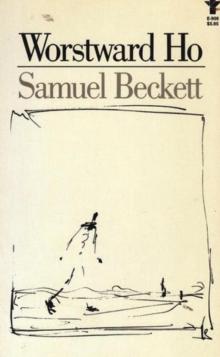 Worstward Ho
Worstward Ho Collected Poems in English and French
Collected Poems in English and French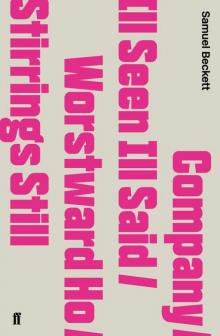 Company / Ill Seen Ill Said / Worstward Ho / Stirrings Still
Company / Ill Seen Ill Said / Worstward Ho / Stirrings Still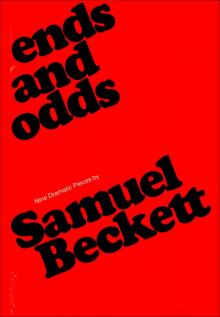 Ends and Odds
Ends and Odds Endgame Act Without Words I
Endgame Act Without Words I Rockabye and Other Short Pieces
Rockabye and Other Short Pieces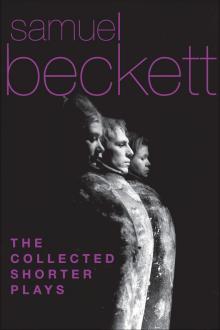 The Collected Shorter Plays
The Collected Shorter Plays The Complete Dramatic Works
The Complete Dramatic Works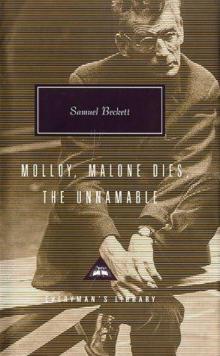 Three Novels: Malloy, Malone Dies, The Unnamable
Three Novels: Malloy, Malone Dies, The Unnamable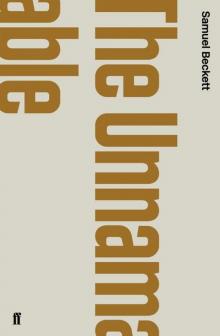 The Unnamable
The Unnamable